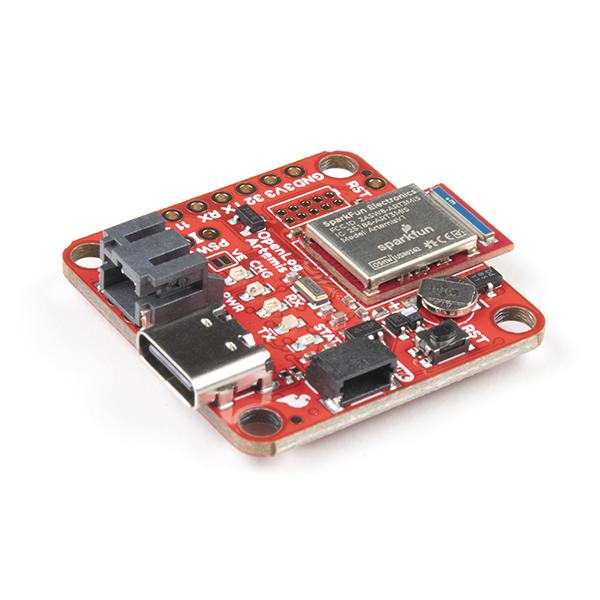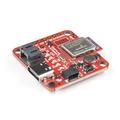SparkFun OpenLog Artemis

Description Links Attachments
OpenLog Artemis comes with an IMU for built-in logging of triple-axis accelerometer, gyro, and magnetometer. It uses the latest ICM-20948 from InvenSense, capable of nearly 250Hz logging of all nine axes. It supports baud rates up to 500000bps, and has four ADC channels available on the edge of the board, capable of logging voltages up to 2V with 14-bit precision. The device also includes an on-board RTC for time-stamped data.
Using the OpenLog Artemis is straightforward. Simply plug in a USB-C cable, open a terminal at 115200bps, and the logging output is automatically streamed to both the terminal and the microSD. It also supports a wide range of Qwiic products, automatically scanning, detecting, configuring, and logging various sensors plugged into the board.
The device uses common microSD cards to record clear text, comma-separated files and supports microSD cards formatted as FAT32 as well as the older FAT16 formats up to 32GB. It also supports very low power logging, with a sleep current of approximately 18uA, allowing for long-term logging with a standard 2Ah battery.
OpenLog Artemis is highly customizable and constantly updated with new features. With the easy-to-use firmware upgrade tool, you can load the latest OLA firmware and add features to your OpenLog Artemis as they become available.
Features of the OpenLog Artemis include an Artemis Module, operating voltage range from 3.3V to 6.5V, current consumption of ~20mA (Run), ~80µA (Sleep), ~18µA (Deep Sleep - regulator shut down), and a variety of ports including 1x USB type C, 1x LiPo battery enabled, 1x Qwiic enabled I2C with power control, 1x SWD 2x5 header, 4x Analog-to-digital, and Serial. It also features an RTC with 1mAhr battery backup, 9-axis IMU logging up to 250Hz, and several LEDs for power, LiPo charge indicator, serial Tx and Rx, and status.
Properties
| Brand | Sparkfun |
| Model | DEV-16832 |
| More info | OpenLog Artemis Hookup Guide - SparkFun Learn |
Alternative products
- SparkFun RedBoard Artemis ATP € 38,- View product
- SparkFun Qwiic OpenLog € 24,50 View product
- SparkFun RedBoard Artemis Nano € 24,50 View product
- SparkFun Artemis Development Kit € 26,75 View product
- SparkFun RedBoard Artemis € 30,50 View product
- SparkFun Thing Plus - Artemis € 32,- View product
- SparkFun OpenLog € 21,50 View product
- SparkFun Artemis Development Kit with Camera € 67,25 View product
Customer questions
Customer Reviews
- In stock Sparkfun Alligator Test Leads - Multicolored (10 Pack) € 6,50 View product
- In stock Sparkfun Teensy Stackable Header Kit (Extended) € 2,90 View product
- In stock Sparkfun RJ45 8-Pin Connector € 2,50 View product
- In stock Sparkfun Voltage Regulator - 3.3V € 2,75 View product
- In stock Sparkfun Qwiic JST Connector - SMD 4-Pin (Vertical) € 1,45 View product
- In stock Sparkfun Capacitor Ceramic 0.1uF € 1,20 View product
- In stock Sparkfun Mini Power Switch - SPDT € 2,30 View product
- In stock Sparkfun Conductive Thread Bobbin - 30ft (Stainless Steel) € 7,25 View product
- In stock Sparkfun Rotary Encoder - Illuminated (RGB) € 7,20 View product
- In stock SparkFun Micro 6DoF IMU Breakout - BMI270 (Qwiic) € 21,75 View product
- In stock Sparkfun Copper Tape - Conductive Adhesive, 5mm - 15 meter € 7,75 View product
- In stock Sparkfun Clear Plastic Knob € 1,75 View product
- Deal In stock -9 % Sparkfun Silicone Electrical Tape - Pack of 10 Strips € 8,65 € 7,85 View product
- In stock Sparkfun Resistor Lead Bending Tool € 11,- View product
- In stock Sparkfun Hobby Motor - Gear € 3,50 View product










